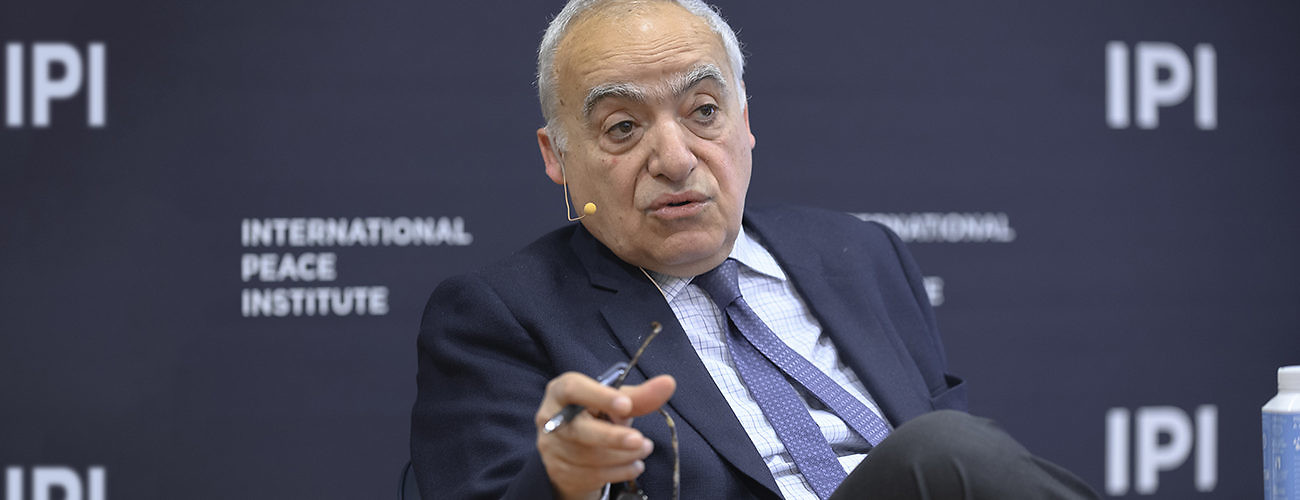The most recent round of fighting that erupted in Libya in April, even as a national conference to find elements of consensus in the country was imminent, threatens to widen into an enduring civil war unless the international community acts now to halt it, said Ghassan Salamé, Special Representative of the Secretary-General and Head of the United Nations Support Mission in Libya (UNSMIL).
“I believe this conflict, left to itself, can only deteriorate and expand, and can lead to a true civil war,” he said.
He urged the international community to “not only contain this conflict,” arguing that letting it continue would have consequences throughout the region. “Leaving this conflict festering before us is a danger for the Libyans first, but also for their neighbors and for peace and security throughout the region,” he said.
He was speaking at a May 22nd IPI “Leading for Peace: Voices from the Field” event a day after warning the UN Security Council that the ongoing battle mounted by renegade military commander Khalifa Haftar and the factional Libyan National Army was “just the start of a long and bloody war.” More than 75,000 people have been driven from their homes in the fighting, and 510 have been killed, according to the World Health Organization (WHO).
General Haftar launched the offensive against the internationally and UN-recognized Government of National Accord on April 4th, and though he has covered lots of ground across the vast country, the effort to capture the capital, Tripoli, has stalled, and there is a military stalemate. “The frontline hasn’t changed an inch in the past month,” Mr. Salamé said.
Though Gen. Haftar has not succeeded in advancing further, he still stands in the way of any settlement, Mr. Salamé said. “If you are looking for a peace formula, you cannot ignore somebody who is not in control but who is to a large extent the largest influence over 75 percent of territory…and 70-75 percent of the oil fields. You cannot say, ‘He does not exist, I do not want to deal with him.’”
Mr. Salamé, a seasoned UN official who has been a professor of international relations at Sciences Po and is the founding dean of its Paris School of International Affairs, lamented what he said was an excessively cynical outside view of the Libyan conflict. “The way people see Libya is more concentrated on Libya as a prize for the shrewdest, the strongest, the most patient and very much less Libya as a country of 6, 7 million people who deserve a decent life after four decades of dictatorship and a decade of chaos. There is not enough of a moral motivation to put an end to this war, and therefore there is less of a political predisposition to take the extra mile to find a solution.”
He suggested this attitude had affected Security Council thinking. “I am not sure that some leading countries in the Security Council are aware enough of the risks they are taking by allowing the conflict to fester,” he said. “This particular conflict can transform, it could mutate in way that we could in a few months truly regret that we did not stop it in time.”
He said that UN credibility had also been put at stake by highly publicized recent breaches of the UN arms embargo, violations that used to be done “quietly, discreetly” but are now boasted about as evidence of armed strength. “The Security Council members should know that the Security Council is not taken seriously when the violations are so blatant and exhibitionist,” he said.
The blunt-spoken Lebanese diplomat noted that Libya, with its oil riches, did not have to rely on outsiders to finance war within its borders. “The truth is that Libya can pay for its own suicide,” he said. “They are committing suicide with their own money. You do not need external fuel for this war…This country is producing 1.2 million barrels of oil a day. This is big money. The country is very wealthy…The conflict does not depend on financial transfers from outside.”
For that reason, he said “if you want a textbook case for a war on resources and how it can turn extremely vicious, Libya is your example.”
The national conference that Mr. Salamé had been organizing since assuming his current post in 2017 was to have taken place on April 14th and 15th. It has been indefinitely postponed because of the conflict.
But on a positive note, he said the UN has had success introducing “political fluidity” in local areas, holding elections in 28 large cities and promising to conduct more regardless of the pressures of the conflict. “We will continue to do as much as we can in these municipal elections between now and the end of the year, whatever happens to the war itself,” he said.
The discussion was moderated by IPI Vice President Adam Lupel.
Related coverage:
Al Jazeera: UN envoy: ‘Libya a textbook example of foreign intervention’
The Guardian: UN envoy attacks lack of ‘moral motivation’ to end Libyan war








